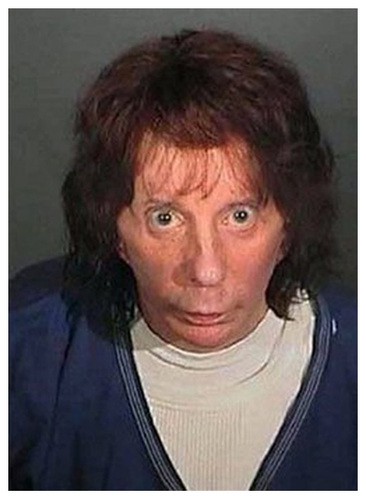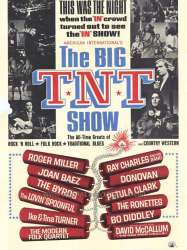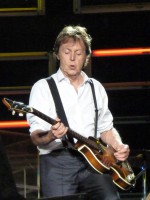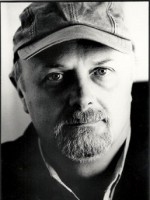Phil Spector is a Actor, Producer and Sound American born on 26 december 1939 at the Bronx (USA)

Phillip Harvey Spector (born Harvey Phillip Spector, December 26, 1939) is an American record producer, songwriter, and the originator of the Wall of Sound production method. At the height of his career, Spector was a pioneer of the 1960s girl-group sound, and produced more than twenty-five Top 40 hits from 1960 to 1965, writing or co-writing many of them for artists such as the Ronettes and the Crystals. Following collaborations with John Lennon, George Harrison, Leonard Cohen, Dion DiMucci, and the Ramones in the 1970s, Spector remained largely inactive. In the 2000s, he became the subject of two trials for murder and a second-degree conviction. He is serving a prison sentence of 19 years to life.
Spector is often called the first auteur among musical artists for acting not only as a producer, but also the creative director, writing or choosing the material, supervising the arrangements, conducting the vocalists and session musicians, and masterminding all phases of the recording process. He helped pave the way for various music genres, with numerous artists later citing his work as a major influence.
For co-producing George Harrison's Concert for Bangladesh (1971), Spector earned the Grammy Award for Album of the Year. In 1989, Spector was inducted into the Rock and Roll Hall of Fame, as a nonperformer. In 1997, he was inducted into the Songwriters Hall of Fame. The 1965 song "You've Lost That Lovin' Feelin'", produced and co-written by Spector for the Righteous Brothers, is listed by BMI as the song with the most U.S. airplay in the 20th century. In 2004, Rolling Stone magazine ranked him #63 on their list of the "Greatest Artists of All Time". Spector-produced albums that were voted within Rolling Stones list of "The 500 Greatest Albums of All Time" include Presenting the Fabulous Ronettes Featuring Veronica (1964), A Christmas Gift for You (1963), and Back to Mono (1991). In 2008, The Washington Times named Spector the second greatest record producer in music history.
In the 1980s, Spector had twin children with then-girlfriend Janis Zavala: Nicole Audrey Spector and Phillip Spector, Jr. (born October 18, 1982). Phillip Jr. died of leukemia on December 25, 1991.
On September 1, 2006, Spector married his third wife, Rachelle Short. Spector met Short at a Hollywood restaurant in 2003, where she was working, shortly after his arrest in the shooting of Clarkson.
Health and illness
In the first criminal trial for the Clarkson murder, defense expert Vincent DiMaio asserted that Spector may be suffering from Parkinson's disease, stating: "Look at Mr. Spector. He has Parkinson's features. He trembles."
Department of Corrections photos from 2013 (released in September 2014) show evidence of a progressive deterioration in Spector's health, according to observers. He has been an inpatient in the California Health Care Facility in Stockton since October 2013. In September 2014, it was reported that Spector had lost his ability to speak due to Laryngeal papillomatosis.
Source : Wikidata
Phil Spector

- Infos
- Photos
- Best films
- Family
- Characters
- Awards
Birth name Harvey Phillip Spector
Nationality USA
Birth 26 december 1939 at the Bronx (USA)
Death 16 january 2021 (at 81 years)
Nationality USA
Birth 26 december 1939 at the Bronx (USA)
Death 16 january 2021 (at 81 years)
Spector is often called the first auteur among musical artists for acting not only as a producer, but also the creative director, writing or choosing the material, supervising the arrangements, conducting the vocalists and session musicians, and masterminding all phases of the recording process. He helped pave the way for various music genres, with numerous artists later citing his work as a major influence.
For co-producing George Harrison's Concert for Bangladesh (1971), Spector earned the Grammy Award for Album of the Year. In 1989, Spector was inducted into the Rock and Roll Hall of Fame, as a nonperformer. In 1997, he was inducted into the Songwriters Hall of Fame. The 1965 song "You've Lost That Lovin' Feelin'", produced and co-written by Spector for the Righteous Brothers, is listed by BMI as the song with the most U.S. airplay in the 20th century. In 2004, Rolling Stone magazine ranked him #63 on their list of the "Greatest Artists of All Time". Spector-produced albums that were voted within Rolling Stones list of "The 500 Greatest Albums of All Time" include Presenting the Fabulous Ronettes Featuring Veronica (1964), A Christmas Gift for You (1963), and Back to Mono (1991). In 2008, The Washington Times named Spector the second greatest record producer in music history.
Biography
Spector's first marriage was to Annette Merar, lead vocalist of the Spectors Three, a 1960s pop trio formed and produced by Spector. His second marriage was to Veronica Bennett, later known as Ronnie Spector. Ronnie was the lead singer of the girl group, the Ronettes (another group Spector managed and produced). Their marriage lasted from 1968 to 1974. They adopted three children, Donté Phillip Spector (born March 23, 1969), Louis Phillip Spector, and Gary Phillip Spector (twins, both born May 12, 1966).In the 1980s, Spector had twin children with then-girlfriend Janis Zavala: Nicole Audrey Spector and Phillip Spector, Jr. (born October 18, 1982). Phillip Jr. died of leukemia on December 25, 1991.
On September 1, 2006, Spector married his third wife, Rachelle Short. Spector met Short at a Hollywood restaurant in 2003, where she was working, shortly after his arrest in the shooting of Clarkson.
Health and illness
In the first criminal trial for the Clarkson murder, defense expert Vincent DiMaio asserted that Spector may be suffering from Parkinson's disease, stating: "Look at Mr. Spector. He has Parkinson's features. He trembles."
Department of Corrections photos from 2013 (released in September 2014) show evidence of a progressive deterioration in Spector's health, according to observers. He has been an inpatient in the California Health Care Facility in Stockton since October 2013. In September 2014, it was reported that Spector had lost his ability to speak due to Laryngeal papillomatosis.
Best films
Usually with
Filmography of Phil Spector (6 films)
Actor
 , 3h24
, 3h24Directed by Martin Scorsese
Origin USA
Genres Biography, Documentary, Musical
Themes Films about music and musicians, Documentary films about music and musicians, Documentaire sur une personnalité, Musical films
Actors George Harrison, Eric Idle, John Lennon, Paul McCartney, Ringo Starr, Neil Aspinall
Roles Self
Rating80%





The film follows music legend George Harrison's story from his early life in Liverpool, the Beatlemania phenomenon, his travels to India, the influence of Krishna Consciousness movement in his music, and his relevance and importance as a member of The Beatles. It consists of previously unseen footage and interviews with Olivia and Dhani Harrison, friends, and many others.

Imagine: John Lennon (1988)
, 1h40Directed by John Lennon, Andrew Solt
Origin USA
Genres Musical theatre, Documentary, Musical
Themes Films about music and musicians, Documentary films about music and musicians, Documentaire sur une personnalité, Musical films
Actors John Lennon, Yoko Ono, Paul McCartney, George Harrison, Ringo Starr, David Bowie
Roles Self
Rating77%





La vie du Beatle John Lennon vue à travers des interviews et des images d'archives inédites.

Easy Rider (1969)
, 1h34Directed by Dennis Hopper
Origin USA
Genres Drama, Action, Adventure, Crime
Themes Medical-themed films, Films about drugs, Transport films, Films about automobiles, Motocyclette, Road movies
Actors Jack Nicholson, Luke Askew, Karen Black, Peter Fonda, Dennis Hopper, Toni Basil
Roles Connection
Rating71%





The protagonists are two freewheeling hippies: Wyatt (Fonda), nicknamed "Captain America", and Billy (Hopper). Fonda and Hopper said that these characters' names refer to Wyatt Earp and Billy the Kid. Wyatt dresses in American flag-adorned leather (with an Office of the Secretary of Defense Identification Badge affixed to it), while Billy dresses in Native American-style buckskin pants and shirts and a bushman hat. The former is appreciative of help and of others, while the latter is often hostile and leery of outsiders.

The Big T.N.T. Show (1966)
Directed by Larry Peerce
Genres Documentary, Musical
Themes Films about music and musicians, Documentary films about music and musicians, Documentaire sur une personnalité, Musical films
Actors Petula Clark, David Crosby, Donovan, David McCallum, Tina Turner, Ronnie Spector
Roles Self (uncredited)
Rating76%





Producer

The Big T.N.T. Show (1966)
Directed by Larry Peerce
Genres Documentary, Musical
Themes Films about music and musicians, Documentary films about music and musicians, Documentaire sur une personnalité, Musical films
Actors Petula Clark, David Crosby, Donovan, David McCallum, Tina Turner, Ronnie Spector
Roles Producer
Rating76%





Sound

The Concert for Bangladesh (1972)
, 1h43Directed by Saul Swimmer
Origin USA
Genres Documentary, Musical
Themes Films about music and musicians, Documentary films about music and musicians, Documentaire sur une personnalité, Concert, Musical films, Children's films
Actors George Harrison, Ravi Shankar, Bob Dylan, Ringo Starr, Billy Preston, Pete Ham
Rating81%





The opening of the movie features footage from the New York press conference, held at Allen Klein's ABKCO offices five days before the concerts, during which Harrison and Ravi Shankar discuss the upcoming shows. Harrison is asked by a reporter: "With all the enormous problems in the world, how did you happen to choose this one to do something about?" "Because I was asked by a friend if I would help, you know – that's all," is his reply.

Let It Be (1970)
, 1h21Directed by Michael Lindsay-Hogg
Origin United-kingdom
Genres Documentary, Musical
Themes Films about music and musicians, Documentary films about music and musicians, Documentaire sur une personnalité, Musical films, Les Beatles
Actors Billy Preston, George Harrison, The Beatles, John Lennon, Paul McCartney, Yoko Ono
Roles Music Producer
Rating75%





En décembre 1968, le réalisateur Michael Lindsay-Hogg tourne The Rock and Roll Circus, un évènement musical organisé par les Rolling Stones auquel participent notamment John Lennon et sa femme Yoko Ono. Aussitôt terminé, le réalisateur se voit offrir, par Paul McCartney, l'opportunité de tourner un documentaire sur l'enregistrement du prochain album des Beatles. Accompagnés par l’équipe de tournage, le groupe se réunit à partir du 2 janvier 1969 dans les studios de cinéma de Twickenham, où ils avaient déjà tourné des scènes pour A Hard Day's Night et Help! et commence à enregistrer. Yoko Ono est présente aussi, assise à côté de John Lennon. L'ambiance est tendue, des désaccords apparaissent, sans compter le fait que les membres du groupe n’apprécient pas les conditions dans lesquelles ils répètent dans cet endroit particulier, sous l'œil de deux caméras tournant en continu. Chaque jour, ils commencent à travailler tôt le matin, ce qui les change profondément de leurs séances nocturnes habituelles aux studios Abbey Road. « Nous n'arrivions pas à nous y habituer, se souviendra Lennon. Les studios Twickenham étaient devenus un endroit cauchemardesque, où il fallait se rendre matin après matin. Nous ne pouvions vraiment pas faire de la musique dès huit heures du matin ni même à dix heures, avec ces objectifs attachés à nos moindres gestes, avec tous les techniciens gravitant autour de nous, attentifs à fixer même nos bâillements. » Durant ces séances, les Beatles jouent de tout et de rien, beaucoup (près de 100 titres seront abordés), font le « bœuf » (jamming), souvent mal, faux et sans conviction.
 Connection
Connection




